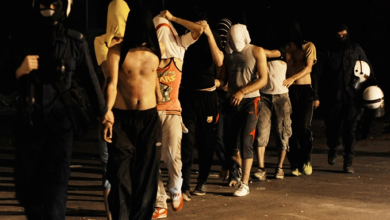Submission to the United Nations about torture to extract confessions in Bahrain’s prisons

Salam for Democracy and Human Rights submitted a complaint to the United Nations regarding torture to extract confessions in the prisons of the ruling Khalifah regime in Bahrain.
The organization addressed the continued use of torture against detainees, especially in pretrial detention, to extract confessions and subject prisoners to cruel, inhuman or degrading treatment with complete impunity.
The Bahraini regime practices one of the most heinous torture practices and the crushing of human rights in the Gulf against its citizens who oppose or violate the regime’s policies.
The events of the Bahraini Spring in February 2011 revealed the fact that the Bahraini regime was indifferent to the principles of human rights and international laws in its confrontation with Bahraini citizens’ exercise of their right to demonstrate and express and demand democratic, economic and social reform in the country.
Human rights organizations highlight the severity of violations and patterns of torture in the Kingdom of Bahrain based on information and testimonies of activists who have faced various forms of torture in Bahraini prisons over the past ten years until now.
The nature of the violations committed and still committed by the Bahraini regime ranged from deprivation of nationality, arbitrary arrest, enforced disappearance, the use of violence against demonstrators, the implementation of death sentences for opponents and the practice of various forms of torture with detainees in prisons where dozens died under torture.
With more than 5000 thousand prisoners, Bahrain achieves one of the highest numbers of political prisoners in the Gulf, while the treatment in Bahraini prisons can be described as the worst in the Gulf.
Many documented cases of torture in Bahraini prisons confirm the torture methods as a repressive policy practised by the authorities against opponents and those calling for political reforms in the country.
The number of deaths inside prisons due to torture and health neglect reached 74, while prisons are filled with thousands of political prisoners, who exceed five thousand.
Since the escalation of the Arab Spring events that began in Tunisia and moved to Egypt, Libya, Syria, Oman and Yemen, Bahrain has been one of the countries most affected by the wave of protests. One of the largest spring protests broke out in the Gulf region.
The regime forces confronted the protests with violence. Still, after clashes with the regime’s security forces with demonstrators, seven people were killed, and hundreds of detainees were held in regime prisons in the first three weeks of the protests.
On March 14, 2011, the Peninsula Shield Forces entered after the Bahraini government requested assistance to achieve security. Saudi and Emirati military forces entered Bahrain, followed by a few days of a military campaign to disperse the sit-in at the Pearl Roundabout and suppress the protests.
By March 18 2011, the regime had managed to eliminate the sit-in centre at the Pearl Roundabout by using excessive force against the demonstrators and carrying out massive arbitrary arrest campaigns.
Bahrain witnessed in this period and in the following years the practice of systematic torture against opponents, demonstrators and members of the Shiite sect, which was the most present in the protests in the country.
Muhammad Sultan, one of the young people participating in the Bahraini Spring 2011 protests, is one of the victims who were tortured at the hands of the regime’s security services.
In March 2011, Sultan was taken to the Criminal Investigation Department after his house was raided and stormed by masked officers who pointed guns at Sultan and his family and threatened to kill them. Sultan was beaten during detention in front of his family, to be tied up and covered, and taken to the investigation centre afterwards.
Sultan was severely beaten in the stomach, face and back while blindfolded, to be asked later to confess, but as Sultan says, he does not know what they want him to confess.
The torture sessions lasted for consecutive days and long periods. Sultan lost consciousness in many of them. Sultan finally signed a confession whose content is unknown and other papers whose content is unknown. Sultan was transferred to another prison with other prisoners, where he continued to receive lousy treatment and humiliation.
On one night in prison, Sultan tells of killing a detainee after he was tortured and stuffed his mouth with newspaper until he suffocated. Sultan was blindfolded and listened to the sounds of torture to death.
Ebtisam Al-Sayegh, a Bahraini human rights activist, after participating in the work of the United Nations Human Rights Council in March 2017, was summoned by the security authorities in Bahrain on May 26, 2017.
The National Security Agency was behind the summons, as I was summoned to the Muharraq Security Center in the north of the country. Al-Sayegh was tortured and sexually assaulted by interrogators and was mistreated and verbally abused. Interrogators threatened her with rape if she continued her human rights activism.
At eleven o’clock at night, they released her to be taken directly to the hospital.
Conditions in Bahraini prisons are terrible. In addition to the willful neglect and stories of torture and ill-treatment, Bahraini prisons are filled with dissident prisoners at many times their capacity. The situation is getting worse over the past two years and the current one with the spread of the Corona epidemic.




